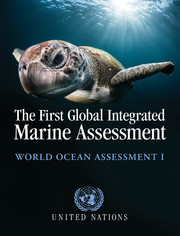Book contents
- Frontmatter
- Dedication
- Epigraph
- Contents
- Foreword and Preface
- Preface
- Summary of the first global integrated marine assessment
- The context of the assessment
- Assessment of Major Ecosystem Services from the Marine Environment (Other than Provisioning Services)
- Assessment of the Cross-cutting Issues: Food Security and Food Safety
- Assessment of Other Human Activities and the Marine Environment
- Assessment of Marine Biological Diversity and Habitats
- Section A Overview of Marine Biological Diversity
- Chapter 36 Overview of Marine Biological Diversity
- Section B Marine Ecosystems, Species and Habitats Scientifically Identified as Threatened, Declining or Otherwise in need of Special Attention or Protection
- I Marine Species
- II Marine Ecosystems and Habitats
- Section C Environmental, economic and/or social aspects of the conservation of marine species and habitats and capacity-building needs
- Overall Assessment
- Annexes
Summary of the first global integrated marine assessment
Published online by Cambridge University Press: 18 May 2017
- Frontmatter
- Dedication
- Epigraph
- Contents
- Foreword and Preface
- Preface
- Summary of the first global integrated marine assessment
- The context of the assessment
- Assessment of Major Ecosystem Services from the Marine Environment (Other than Provisioning Services)
- Assessment of the Cross-cutting Issues: Food Security and Food Safety
- Assessment of Other Human Activities and the Marine Environment
- Assessment of Marine Biological Diversity and Habitats
- Section A Overview of Marine Biological Diversity
- Chapter 36 Overview of Marine Biological Diversity
- Section B Marine Ecosystems, Species and Habitats Scientifically Identified as Threatened, Declining or Otherwise in need of Special Attention or Protection
- I Marine Species
- II Marine Ecosystems and Habitats
- Section C Environmental, economic and/or social aspects of the conservation of marine species and habitats and capacity-building needs
- Overall Assessment
- Annexes
Summary
Introduction
Let us consider how dependent on the ocean we are. The ocean is vast: it covers seven tenths of the planet, is on average about 4,000 metres deep and contains 1.3 billion cubic kilometres of water (97 per cent of all the water on the surface of the Earth). There are, however, 7 billion people on Earth. This means that each one of us has just one fifth of a cubic kilometre of ocean as our portion to provide us with all the services that we get from the ocean. That small, one fifth of a cubic kilometre portion generates half of the annual production of the oxygen that each of us breathes, and all of the sea fish and other seafood that each of us eats. It is the ultimate source of all the freshwater that each of us will drink in our lifetimes.
The ocean is a highway for ships that carry the goods that we produce and consume. The seabed and the strata beneath it hold minerals and oil and gas deposits that we increasingly need to use. Submarine cables across the ocean floor carry 90 per cent of the electronic traffic of communications, financial transactions and information exchange. Our energy supply will increasingly rely on sea-based wind turbines and wave and tidal power from the ocean. Large numbers of us take our holidays by the sea. The seabed is a rich repository for archaeology.
That one fifth of a cubic kilometre also suffers from the sewage, garbage, spilled oil and industrial waste which we collectively allow to go into the ocean every day. Demands on the ocean continue to rise together with the world's population. By the year 2050, it is estimated that there will be 10 billion people on Earth. Our portion, or our children's portion, of the ocean will then have shrunk to one eighth of a cubic kilometre. That reduced portion will still have to provide each of us with oxygen, food and water, while still suffering from the pollution and waste that we allow to enter the ocean.
The ocean is also home to a rich diversity of animals, plants, seaweeds and microbes, from the largest animal on the planet (the blue whale) to plankton and bacteria that can only be seen with powerful microscopes.
- Type
- Chapter
- Information
- The First Global Integrated Marine AssessmentWorld Ocean Assessment I, pp. 11 - 44Publisher: Cambridge University PressPrint publication year: 2017
- 1
- Cited by



